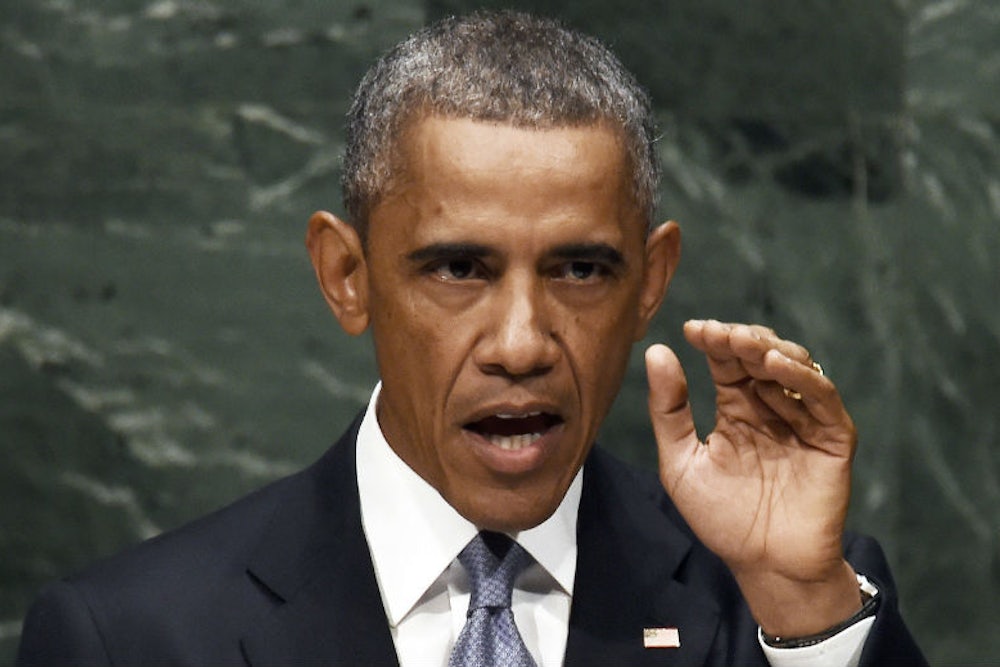No matter one’s politics, there was something incongruous about President Barack Obama’s appearance last week at the United Nations General Assembly. The U.N., after all, was intended as the great institutionalization of a centuries-long yearning for collective security. This was the dream that began with Kant’s Perpetual Peace, that continued with Woodrow Wilson’s vision of “not a balance of power, but a community power,” and that might have reached its culmination after two world wars. But here the world watched an American president stand before the body whose raison d'etre is the protection of “international peace and security” through “effective collective measures for the prevention and removal of threat,” and explain that the U.S. would be taking its job: “the United States of America will work with a broad coalition to dismantle this network of death…We will use our military might in a campaign of air strikes to roll back ISIL.”
In the years after the American invasion of Iraq, the world seemed to have had enough of American adventurism abroad. International approval of the U.S. plummeted, and even Americans began to mock the country’s “Team America World Police” delusions of grandeur. It seemed ludicrous for one country to arrogate to itself the protection of global stability and the prevention of large-scale atrocities. But recent events are making increasingly clear that critics of American expeditions abroad simply have no alternative. Amid a near total abdication of responsibility by other countries, the dream of collective security is revealing itself to be precisely that: a dream.
To be sure, some international lawyers have called foul at the American-led campaign against the Islamic State, insisting on the indispensability of the U.N.. But these objections have been drowned out in a sea of international support and responses that somewhat resemble Secretary of State Madeline Albright’s scathing recommendation in 1999 that Britain “get some new lawyers” to approve the intervention in the Balkans. Germany and France, the very countries that led the opposition to the 2003 invasion of Iraq, sit placidly (if somewhat impotently) in the American coalition. And the state voices condemning U.S. actions as inconsistent with principles of international governance – largely Russian and Iranian – are so self-evidently disingenuous that they undermine their own claims. That is how little we have come to expect from the U.N,, our great institution of collective security.
It is easy to blame this collapse in confidence on the structural problems of the U.N. Security Council. With Russia and China wielding vetoes, we can hardly expect the Security Council to adopt a principled stand on much of anything. But collective security need not be tied to a dysfunctional institution. During World War II, Franklin Roosevelt famously hoped for a world order preserved by “four nations with great military power stick[ing] together in determination to keep the peace.” But today, there are not four such nations. There is one. And the focus on the structural deficiencies of the Security Council conceals a deeper problem that even the most utopian fantasies of institutional reform cannot resolve: most liberal democracies have simply given up on military engagement abroad.
Over the past ten years, European defense spending has plummeted, both in absolute terms and as a percentage of their economies. Most European countries now spend well below 2 percent of GDP on their militaries (even post-sequestration, the U.S. still spends close to 3.8 percent), and the United States has been left carrying the tab for three-quarters the cost of NATO. In the current conflict against ISIS, the most brutal regime the world has seen in years, France has bombed “a warehouse” and “carried out reconnaissance flights,” Germany has “sent 40 paratroopers to Iraq to provide weapons training,” and Britain has given the “go-ahead to take part in air strikes in the future.” Denmark and Belgium have sent six fighter jets apiece. Behold, our grand alliance.
In a "60 Minutes" interview just a few days ago, host Steve Kroft questioned Obama on America’s seeming inability to escape outsize roles in international interventions. Why was America “once again leading the operation” and “doing 90 percent” to combat a global threat that affects other countries far more immediately? The president’s response was a mixture of weariness and pride: “That's always the case. America leads… Our military is the best in the history of the world. And when trouble comes up anywhere… they don't call Beijing. They don't call Moscow. They call us.” It is a sad statement of our current predicament that Obama didn’t even bother to mention Paris or London.
This is the world in which we live. It is not enough for lawyers to see mass atrocities and sagely agree that someone has done something illegal. As long as threats like the Islamic State persist, someone must do something about them. The United States, for all of its faults, foibles and failures, is still the only country with the will and the capability to intervene credibly. Real multi-party, collective security remains a lawyer’s fantasy precisely because most liberal democracies continue to treat it as such. Until that changes, American interventions must continue. There is simply no alternative.
